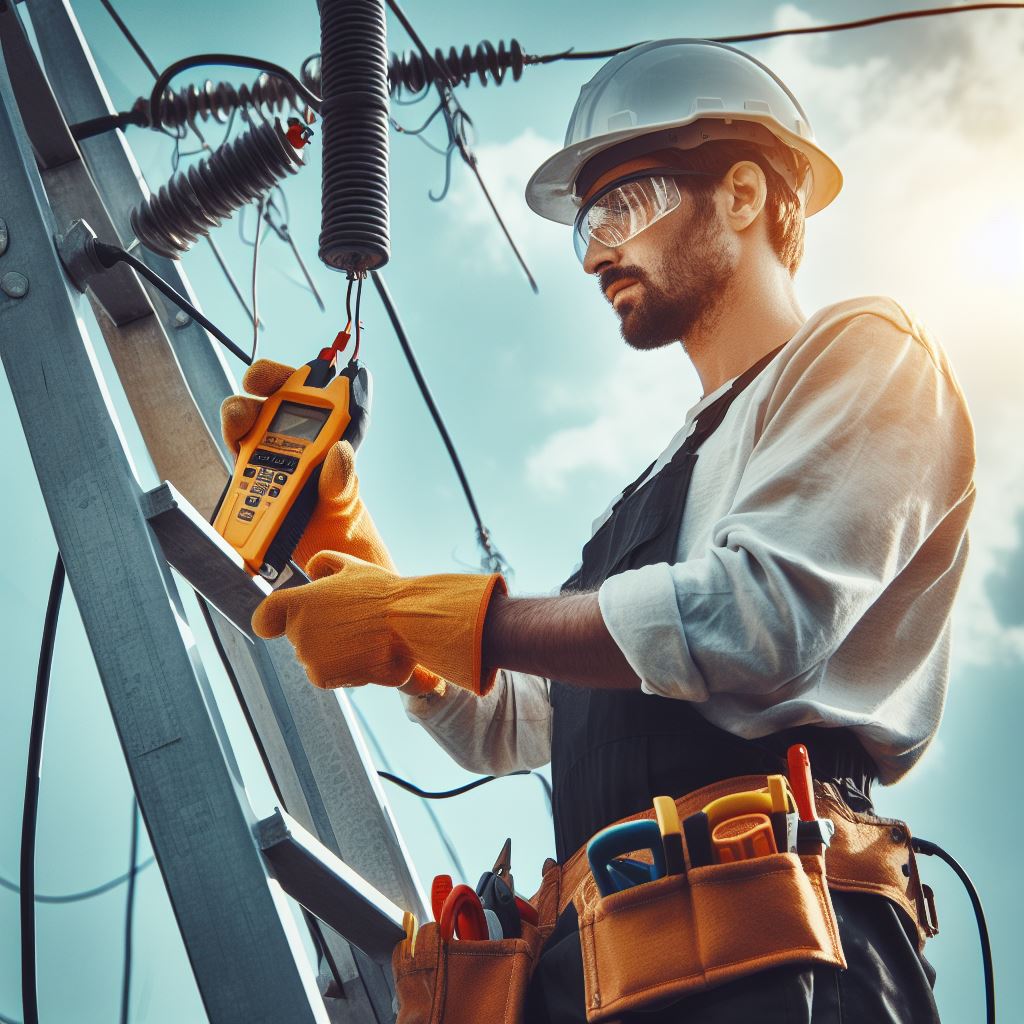Introduction
Have you ever wondered who keeps our lights on and our appliances running smoothly?
Electricians are skilled professionals who install, repair, and maintain electrical systems.
Play a crucial Role of Electricians in Modern America by ensuring the safe and efficient functioning of electrical systems.
Electricians, the unsung heroes of modern society, ensure its smooth functioning and convenience.
Their expertise shapes our daily lives profoundly.
In today’s technologically advanced world, electrical systems power our homes, businesses, and industries from dawn to dusk.
Electricians, responsible for safe installations, meticulously wire buildings, powering lights, appliances, and devices, preventing potential hazards like fires or shocks.
Beyond installation, they provide regular maintenance and troubleshooting, ensuring efficient and reliable electrical systems.
In addition to technical skills, electricians stay updated on electrical codes and regulations, guaranteeing safety and infrastructure reliability.
In summary, electricians are indispensable in modern America, ensuring safe and efficient electrical systems.
Without them, our conveniences would be jeopardized, emphasizing the vital role of electricians in modern America, appreciating their work is paramount.
The Training and Education of Electricians
Overview of the requirements to become an electrician
High school diploma or equivalent is required to enter electrician training programs.
Physical stamina, manual dexterity, and good vision are important qualities for electricians.
Completion of an electrician training program is necessary to acquire the required skills.
Most electrician training programs include both classroom instruction and hands-on practical experience.
Basic courses cover topics like electrical theory, blueprint reading, mathematics, and safety practices.
Specialized courses focus on areas such as electrical systems, wiring, motor controls, and circuitry.
Apprenticeships and on-the-job training are common avenues for further developing practical skills.
During apprenticeships, aspiring electricians work under the supervision of experienced professionals.
Apprenticeships provide real-world experience and allow for the application of theoretical knowledge.
After completing apprenticeships, electricians are usually considered journey workers and can work independently.
State or local licensing boards may require electricians to pass an exam to become licensed.
Transform Your Career Today
Unlock a personalized career strategy that drives real results. Get tailored advice and a roadmap designed just for you.
Start NowLicense requirements may include documenting work experience and passing a comprehensive examination.
Discussion of trade schools, apprenticeships, and licensing exams
Trade schools provide comprehensive education and training specific to the electrical trade.
These schools offer structured programs that can be completed in a shorter time frame.
Trade school graduates may be eligible for entry-level positions or apprenticeships.
Apprenticeships combine on-the-job training with classroom instruction in a formal apprenticeship program.
Apprenticeships typically last 4 to 5 years and allow for practical skills development.
During apprenticeships, aspiring electricians receive mentorship from experienced professionals.
Licensing exams assess an individual’s knowledge and skills in the electrical trade.
These exams ensure that electricians meet minimum competency standards required for the profession.
The content of licensing exams may vary depending on the specific state or local jurisdiction.
Passing a licensing exam is often a prerequisite for obtaining a journeyman or master electrician license.
Continued education and training are necessary to stay updated with evolving codes, regulations, and technologies.
Importance of ongoing education and keeping up with technological advancements
Electricians need to continually update their knowledge and skills due to rapidly advancing technology.
Ongoing education helps electricians stay abreast of changing electrical codes and safety practices.
Understanding new technologies allows electricians to provide efficient and innovative solutions.
Continued professional development ensures that electricians remain competitive in the industry.
Electricians who stay informed about advancements can offer better services to their clients.
Training programs and seminars provide opportunities for electricians to enhance their expertise in specialized areas.
Specializations such as role of Electricians in Modern America, smart home systems, and energy-efficient technologies are becoming increasingly important.
By expanding their skill set, electricians can adapt to the evolving needs of the modern electrical industry.
Transform Your Career Today
Unlock a personalized career strategy that drives real results. Get tailored advice and a roadmap designed just for you.
Start NowOngoing education also promotes safe practices, helping to prevent electrical accidents and hazards.
Ultimately, electricians who prioritize ongoing education contribute to the overall progress of the electrical trade.
Read: Balancing Work and Family Life as a Plumber in the US
Understanding the Responsibilities of Electricians
Overview of the different types of electricians
- Residential electricians specialize in working on electrical systems in homes and apartments.
- Commercial electricians focus on electrical systems in commercial buildings, offices, and retail spaces.
- Industrial electricians handle large-scale electrical systems in factories, plants, and industrial settings.
Explanation of their primary responsibilities
Electricians are skilled professionals trained to handle a wide range of tasks:
- Installing electrical systems involves wiring buildings, connecting power sources, and setting up lighting fixtures.
- Maintaining electrical systems requires regular inspections, testing circuits, and conducting preventive maintenance.
- Troubleshooting is a critical responsibility where electricians diagnose and fix issues in electrical systems.
- Repairing electrical systems is part of an electrician’s daily tasks to ensure proper functioning and safety.
Importance of adhering to safety codes and regulations to prevent accidents and fires
Electricians must prioritize safety and follow specific codes and regulations:
- Adhering to safety codes ensures that electrical installations are done correctly and minimize the risk of accidents.
- Following regulations helps safeguard people’s lives, property, and the environment from electrical hazards.
- Strict adherence to safety codes reduces the chances of electrical fires, which can be devastating and life-threatening.
- Compliance with regulations demonstrates professionalism and responsibility in the electrician’s work.
Electricians are pivotal in modern America, ensuring safe and efficient electrical system operations.
Specializing in residential, commercial, or industrial work, they handle diverse responsibilities.
Residential electricians install and maintain home electrical systems, including wiring, power connections, and lighting fixtures.
Commercial electricians focus on electrical infrastructure in offices and retail spaces, maintaining power distribution systems and troubleshooting issues.
Industrial electricians manage large-scale systems in factories, handling complex machinery, high-voltage systems, and equipment functionality.
Common responsibilities include regular inspections, circuit testing, preventive maintenance, and troubleshooting electrical issues.
Skilled at identifying and fixing problems, electricians promptly address faults to restore functionality efficiently.
Safety is paramount, with adherence to codes covering grounding, insulation, and proper device usage.
Personal protective equipment and established procedures minimize risks during potentially dangerous tasks.
Strict compliance with safety standards reduces the risk of electrical fires, showcasing electricians’ professionalism.
Their diverse roles emphasize their commitment to safe installations, maintenance, and repairs, shaping the reliability and safety of electrical systems in modern America.
Read: Overcoming Challenges: Adapting to US Plumbing Innovations

Collaboration with Other Professionals
Importance of working closely with architects, engineers, and construction workers
- Collaborating with other professionals is essential for electricians to ensure successful projects.
- To create safe and reliable electrical systems, electricians rely on architects, engineers, and construction workers.
- Working closely together allows for efficient planning and implementation of electrical installations.
- By collaborating, electricians can provide input on electrical requirements and ensure the design meets safety standards.
- Cooperation with architects, engineers, and construction workers helps prevent costly mistakes and delays.
- This collaboration ensures that electrical systems are seamlessly integrated into the overall design and construction process.
Collaborative projects: integrating electrical systems into building plans and ensuring functionality
In collaborative projects, electricians play a crucial role in integrating electrical systems into building plans.
Working alongside architects and engineers, electricians assess the building’s electrical needs and develop a comprehensive plan.
Collaboration ensures the efficient and accurate placement of outlets, switches, lighting fixtures, and other electrical components.
By integrating electrical systems early in the planning stage, electricians can avoid design flaws and ensure functionality.
They help determine the appropriate kilowatt capacity, circuit layouts, and distribution panels for each specific building.
This collaborative approach ensures that electrical systems are seamlessly integrated, resulting in efficient and safe buildings.
Communication and teamwork skills required for successful collaborations
Successful collaborations among electricians, architects, engineers, and construction workers require strong communication and teamwork skills.
Clear and concise communication is vital for effective collaboration.
Electricians must accurately convey their electrical requirements, limitations, and recommendations to the other professionals.
Active listening is equally important, as electricians need to understand the architectural and engineering constraints.
Teamwork is essential to ensure the smooth execution of the project.
Effective collaboration depends on the willingness to share knowledge, expertise, and ideas.
Electricians must work closely with the other professionals, respecting their roles and responsibilities.
This collaborative environment fosters creativity, problem-solving, and innovation, leading to better overall project outcomes.
In essence, collaboration with other professionals is crucial for electricians to succeed in modern America.
Working closely with architects, engineers, and construction workers ensures safe and efficient electrical systems.
Collaborative projects allow for the seamless integration of electrical systems into building plans and guarantee functionality.
Strong communication and teamwork skills are essential for successful collaborations.
By fostering effective collaboration, electricians contribute to the creation of reliable and sustainable buildings.
Read: Real Stories: Day in the Life of an American Plumber
Impact on Society and the Economy
Electricians’ Contribution to the Overall Functioning of Society
Electricians play a crucial role in ensuring the smooth functioning of society.
Transform Your Career Today
Unlock a personalized career strategy that drives real results. Get tailored advice and a roadmap designed just for you.
Start Now- Safety and Security : Electricians guarantee that electrical systems operate safely, preventing accidents and hazards.
- Energy Efficiency: They install and maintain energy-efficient systems, reducing energy consumption and promoting sustainability.
- Essential Service: Electricians ensure uninterrupted power supply for critical services like hospitals, schools, and emergency facilities.
- Vital Infrastructure: They contribute to the construction of infrastructure projects such as power grids, transportation systems, and buildings.
Economic Benefits of Electrical Work
Electrical work not only benefits society but also supports economic growth and development.
- Job Creation: Electricians create employment opportunities, from installation to maintenance and troubleshooting.
- Skilled Workforce: The electrical industry demands skilled workers, leading to vocational training and specialization.
- Business Expansion: Reliable electrical systems attract businesses, stimulating economic activity and investment.
- Increased Productivity: Efficient electrical systems enhance productivity in commercial and industrial sectors, boosting economic output.
The Importance of Reliable Electrical Systems
Reliable electrical systems are vital for various entities, including homes, businesses, and public facilities.
- Businesses: Continuous power supply ensures smooth operation, preventing revenue loss and business interruptions.
- Home: Electricians maintain safe electrical systems, providing comfort, convenience, and security for households.
- Public Facilities: Reliable electrical systems are crucial for public safety, transportation networks, and municipal services.
- Infrastructural Development: Properly functioning electrical systems are a prerequisite for developing infrastructure projects.
Electricians have a significant impact on society and the economy.
They contribute to the overall functioning of society by ensuring safety, energy efficiency, and the provision of essential services.
Economically, electrical work generates employment, fosters a skilled workforce, attracts business investment, and enhances productivity.
Moreover, reliable electrical systems are essential for businesses, homes, and public facilities, as well as supporting infrastructural development.
Recognizing the importance of electricians and their work is crucial for maintaining a functional and prosperous society.
Read: Demand Forecast: The Future of Plumbing Jobs in the USA
Learn More: Emerging Technologies in Welding: US Industry’s Adaptation
Advancements in Electrical Technology
Overview of technological advancements in the electrical industry
- Introduction of smart homes and automation systems revolutionizing the electrical industry.
- Incorporation of advanced safety measures in electrical systems ensuring better protection.
- Rise of energy-efficient electrical appliances reducing carbon footprint and energy consumption.
- Implementation of wireless communication systems for enhanced control and monitoring.
- Growth of electric vehicles and charging infrastructure demanding electrical upgrades.
Impact of renewable energy on the role of electricians
- Increasing demand for solar panels creating a need for electricians to install and maintain them.
- Integration of wind turbines into the electrical grid requiring electricians’ expertise for proper connectivity.
- Emergence of battery storage systems necessitating electricians for their installation and maintenance.
- Transition towards green energy highlighting role of Electricians in Modern America
- Electricians becoming experts in handling and troubleshooting in role of Electricians in Modern America
Importance of electricians in the installation and maintenance of smart technology and automation systems
- Electricians playing a crucial role in the installation and configuration of smart home systems.
- Expertise of electricians required to ensure proper wiring and connectivity of automated devices.
- Maintenance and repair of complex automation systems demanding specialized electricians.
- Electricians providing troubleshooting solutions for smart technology malfunctions.
- Ensuring the secure integration of automation systems with electrical infrastructure.
With the rapid advancements in electrical technology, the role of electricians has evolved significantly.
Today, electricians not only focus on traditional electrical systems but also embrace the latest innovations.
The following sections explore the impact of technological advancements in the electrical industry, the influence of renewable energy, and the significance of electricians in the installation and maintenance of smart technology and automation systems.
Overview of technological advancements in the electrical industry
The electrical industry has witnessed remarkable advancements in recent years.
One of the major breakthroughs is the introduction of smart homes and automation systems.
These systems allow homeowners to control and monitor various aspects of their homes, ranging from lighting and temperature to security.
Electricians have adapted to this technological shift and gained expertise in installing and configuring these systems.
In addition to smart homes, the electrical industry has focused on enhancing safety measures.
Advanced circuit breakers, ground fault circuit interrupters (GFCIs), and arc fault circuit interrupters (AFCIs) have been integrated into electrical systems.
These safety mechanisms have significantly reduced the risk of electrical accidents, making homes and commercial buildings safer.
Another notable advancement is the implementation of energy-efficient electrical appliances.
Transform Your Career Today
Unlock a personalized career strategy that drives real results. Get tailored advice and a roadmap designed just for you.
Start NowRole of Electricians in Modern America in installing these appliances, such as energy-efficient lighting, HVAC systems, and energy management systems.
These advancements have not only reduced energy consumption but also contributed to environmental sustainability by minimizing carbon footprint.
Wireless communication systems have also become prevalent in the electrical industry.
Electricians now handle systems that rely on wireless technology for control and monitoring.
They ensure the seamless integration of these wireless systems with electrical infrastructure, enabling remote access and efficient management.
The rise of electric vehicles (EVs) has brought about a surge in demand for electricians.
Electric vehicle charging infrastructure requires installation and maintenance by electricians to ensure safe and efficient charging.
Additionally, electricians provide expertise in upgrading electrical systems to accommodate the increased electrical load associated with EV charging.
Impact of Role of Electricians in Modern America
The shift towards renewable energy sources has brought new opportunities for electricians.
Solar panels, for instance, have become increasingly popular as a source of clean energy.
Electricians play a critical role in installing and maintaining solar panels.
They ensure proper wiring and connectivity, taking into account factors like panel placement, required permits, and compliance with regulations.
Furthermore, the integration of wind turbines into the electrical grid requires electricians’ expertise.
Electricians are involved in establishing the electrical connections between turbines and the grid, enabling efficient power transmission.
They also perform routine maintenance and troubleshooting to ensure the seamless operation of wind energy systems.
Battery storage systems have emerged as another aspect of renewable energy.
These systems store excess energy generated from renewable sources for later use.
Electricians are responsible for installing and maintaining battery storage systems, ensuring their proper functioning and efficient utilization of stored energy.
The movement towards green energy emphasizes the role of electricians in promoting sustainable practices.
Electricians’ expertise in renewable energy systems helps individuals and companies transition to clean energy solutions, reducing dependence on fossil fuels and contributing to a greener future.
Transform Your Career Today
Unlock a personalized career strategy that drives real results. Get tailored advice and a roadmap designed just for you.
Start NowImportance of electricians in the installation and maintenance of smart technology and automation systems
As smart technology and automation systems gain popularity, electricians have become integral in their installation and maintenance.
Electricians possess the knowledge and skills required to configure and install smart home systems, offering homeowners efficient control and automation capabilities.
Electrical expertise is crucial in ensuring proper wiring and connectivity of automated devices in homes and commercial buildings.
Electricians verify compatibility, install necessary components, and establish connections for seamless operation.
Their role goes beyond traditional electrical work, encompassing the integration of automation systems with existing electrical infrastructure.
Maintenance and repair of complex automation systems often require specialized electricians.
These professionals possess in-depth knowledge of the various components and subsystems within smart homes.
They troubleshoot and resolve issues, ensuring the optimal performance of automation systems.
When smart technology malfunctions, electricians provide troubleshooting solutions.
They diagnose and repair any electrical or connectivity issues, ensuring that automated devices function as intended.
Electricians’ expertise saves homeowners from potential frustrations and guarantees uninterrupted automation.
Moreover, electricians ensure the secure integration of automation systems with electrical infrastructure.
They implement proper grounding and protective measures to prevent electrical hazards associated with smart technology.
Electricians understand the interdependencies between electrical systems and automation, ensuring the safety and reliability of the entire setup.
Essentially, advancements in electrical technology have transformed the role of electricians.
From embracing smart homes and automation systems to incorporating renewable energy, electricians play a critical part in modern America.
Their expertise in installation, maintenance, and troubleshooting is essential in meeting the demands of a rapidly evolving electrical industry.
Career Opportunities and Future Outlook
Current and Future Demand for Electricians
Role of Electricians in Modern America, and their demand is only expected to grow.
The increasing need for energy-efficient infrastructure, technological advancements, and the push for renewable energy sources all contribute to a steady demand for electricians.
According to the U.S. Bureau of Labor Statistics, the employment of electricians is projected to grow 8 percent from 2020 to 2030, which is faster than the average for all occupations.
Transform Your Career Today
Unlock a personalized career strategy that drives real results. Get tailored advice and a roadmap designed just for you.
Start NowThis growth is primarily driven by the construction industry, as new buildings and infrastructure developments require electrical systems.
Furthermore, the aging electrical workforce leads to retirement openings, creating job opportunities for aspiring electricians.
As experienced electricians leave the workforce, there will be a need for skilled professionals to replace them.
Diverse Career Paths within the Electrical Industry
The electrical industry offers numerous career paths for electricians, allowing individuals to specialize and advance their skills in various areas.
Here are some examples:
- Residential Electrician: specializing in electrical installations, repairs, and maintenance for homes.
- Commercial Electrician: focusing on electrical systems in commercial buildings, such as office spaces and retail stores.
- Industrial Electrician: working with complex electrical systems in industrial settings, including factories and manufacturing plants.
- Outside Lineman: responsible for installing and maintaining electrical power systems that deliver electricity to homes and businesses.
- Electrical Engineer: designing and developing electrical systems, including wiring, lighting, and control systems.
These career paths provide electricians with options to specialize in their area of interest and expertise, allowing them to excel and advance within the industry.
Importance of Continuous Professional Development and Specialization
As technology advances and electrical systems become more sophisticated, continuous professional development and specialization are of utmost importance for electricians.
Staying updated with the latest electrical codes, regulations, and safety protocols is essential to ensure the highest level of competency and safety in their work.
Electricians must regularly participate in relevant training programs and educational courses to enhance their knowledge and skills.
Moreover, specialization in specific areas, such as renewable energy systems, home automation, or energy management, can open up even more career opportunities.
Electricians who become experts in these emerging fields have a competitive advantage and are in high demand.
Continuous professional development not only benefits electricians individually but also contributes to the overall growth and advancement of the electrical industry.
Highly skilled and knowledgeable electricians are essential for the successful implementation of new technologies and the overall progress of the industry.
The demand for electricians in modern America is expected to rise steadily, driven by factors such as infrastructure development, technological advancements, and retirements within the current workforce.
Electricians have diverse career paths to choose from and can specialize in various areas, further enhancing their opportunities.
Continuous professional development and specialization are crucial for electricians to stay competent and meet the evolving demands of the industry.
Conclusion
Electricians power modern America, ensuring safe electrical systems.
They install, repair, and maintain wiring, lighting, and appliances.
Their expertise drives technological advancement, illuminating the nation’s progress.
Electricians play a pivotal role, enabling homes and businesses to function seamlessly.
In a world reliant on electricity, their active involvement shapes the landscape of contemporary living.
From intricate installations to resolving electrical faults, electricians are the backbone of our electrified society.
Their proactive approach ensures the smooth operation of power networks, supporting the nation’s infrastructure.
Role of Electricians in Modern America extends beyond technical skills; they enhance energy efficiency and implement cutting-edge technologies, contributing to a sustainable and technologically advanced future.
As indispensable contributors to modern America, electricians illuminate the path to progress and innovation.
[E-Books for Sale]
The Big Book of 500 High-Paying Jobs in America: Unlock Your Earning Potential
$19.99 • 500 High-Paying Jobs • 330 pages
Explore 500 high-paying jobs in America and learn how to boost your career, earn more, and achieve success!
See All 500 High-Paying Jobs of this E-Book
1001 Professions Without a Degree: High-Paying American Jobs You Can Start Now
$19.99 • 1001 Professions Without a Degree • 174 pages
Discover 1001 high-paying jobs without a degree! Unlock career tips, skills, and success strategies for just $19.99!




